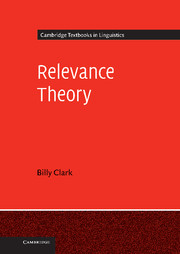Book contents
- Frontmatter
- Contents
- List of Figures and tables
- Preface
- Acknowledgements
- Typographical conventions
- Part I Overview
- Part II Details and developments
- 5 Explicature and implicature
- 6 Types of explicature
- 7 Types of implicature
- 8 Lexical pragmatics
- 9 Figurative language: metaphor
- 10 Figurative language: irony
- 11 Linguistic semantics
- 12 Conclusion: applications and recent developments
- Appendix Key notions of relevance theory
- Notes to chapters
- Bibliography and other resources
- Index
7 - Types of implicature
from Part II - Details and developments
Published online by Cambridge University Press: 05 June 2013
- Frontmatter
- Contents
- List of Figures and tables
- Preface
- Acknowledgements
- Typographical conventions
- Part I Overview
- Part II Details and developments
- 5 Explicature and implicature
- 6 Types of explicature
- 7 Types of implicature
- 8 Lexical pragmatics
- 9 Figurative language: metaphor
- 10 Figurative language: irony
- 11 Linguistic semantics
- 12 Conclusion: applications and recent developments
- Appendix Key notions of relevance theory
- Notes to chapters
- Bibliography and other resources
- Index
Summary
Topics: implications and implicatures; implicated premises and implicated conclusions; deriving implicatures; strength of implicatures
Overview
In the last chapter, we looked in more detail at the relevance-theoretic notion of explicature and the different types of explicature which can be communicated. This chapter looks in more detail at the notion of ‘implicature’. We start, in the next section, by considering the difference between implications and implicatures. Implications are conclusions which follow logically from one or more premises. Implicatures are intentionally communicated implications. This means that, for any utterance, its implicatures constitute a subset of its implications and so the task of interpreting an utterance can be understood either as finding the implications intended by the communicator or as deciding which of a range of implications of an utterance constitute its implicatures. Section 7.3 looks at the difference between implicated premises and implicated conclusions. Implicated premises are inferred so that they can then act as the input to further inferential processes. Implicated conclusions are inferred through the interaction of implicated premises with other assumptions, including explicatures of the utterance. Separating implicated premises and implicated conclusions is not easy, particularly since any conclusion worth having is worth having because it enables us to make further inferences based on it. This section also explores the relationship between contextual assumptions and implicated premises. Complications arise here because contextual assumptions may need to be inferred for the first time in understanding an utterance (in which case they are clearly implicated premises) or they may already be manifest to the hearer (in which case, I will suggest, they are still implicated premises, since the speaker has provided evidence of an intention to make them more manifest by producing the utterance whose interpretation required them). Section 7.4 looks in more detail at the process of deriving implicatures and Section 7.5 considers how implicatures can vary in strength.
- Type
- Chapter
- Information
- Relevance Theory , pp. 216 - 239Publisher: Cambridge University PressPrint publication year: 2013



